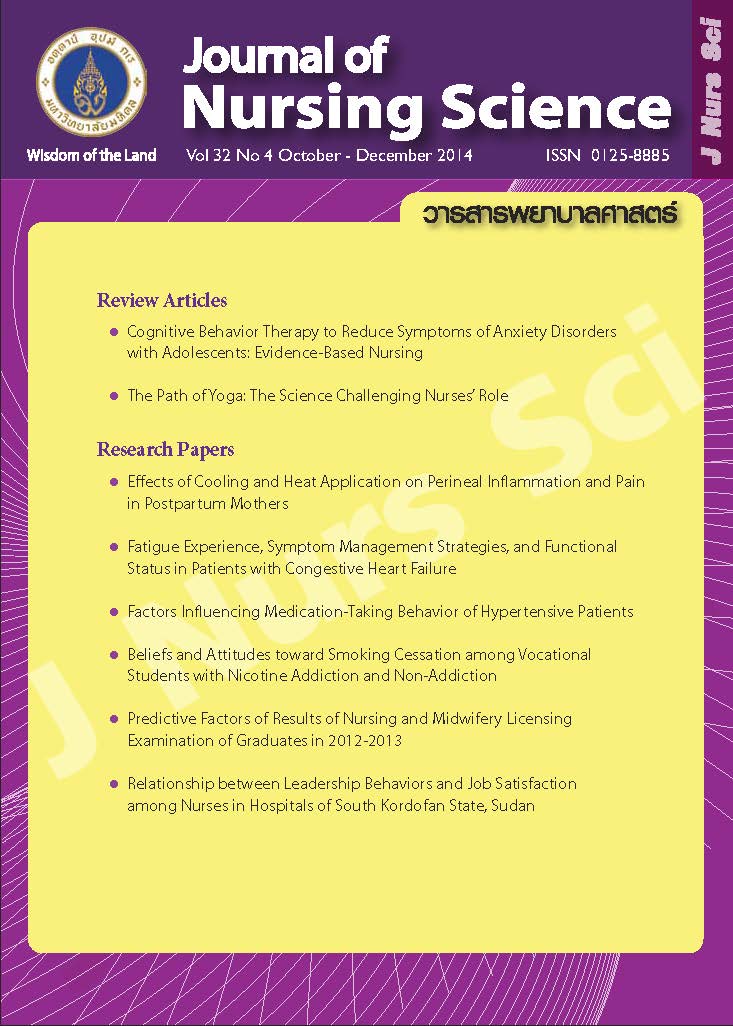Fatigue Experience, Symptom Management Strategies, and Functional Status in Patients with Congestive Heart Failure
Main Article Content
Abstract
Purpose: To explore symptom experience, management strategies, and functional status and to examine the relationships between fatigue experience, management strategies, and functional status of patients with congestive heart failure (CHF).
Design: Descriptive correlational study.
Methods: The sample included 88 patients with CHF at the heart failure clinic and the cardiac medical ward of a tertiary hospital in Nonthaburi province. Data were collected using questionnaires on demographic characteristics, the Piper fatigue scale-12, management strategies, and the Functional Performance Inventory Short Form (PFI-SF). Data were analyzed using descriptive statistics and Pearson’s Product Moment Correlation Coefficient.
Main findings: The mean score of fatigue experience was at a high level (mean = 7.32, SD = .59). The fatigue management strategy that was most commonly used and most effective was sleeping. The mean score of functional status was at a moderate level (mean = 1.23, SD = .30). Fatigue experience was negatively correlated with functional status (r = - .32, p < .01) and fatigue management strategies were positively correlated with functional status (r = .36, p < .05).
Conclusion and recommendations: Nurses should assess fatigue experience in patients with CHF and provide them with guidance on good sleep hygiene. For further research, a sleep hygiene program should be developed to manage their fatigue and promote their functional status.
Keywords: fatigue experience, fatigue management strategies, functional status, congestive heart failure
ประสบการณ์อาการเหนื่อยล้า กลวิธีการจัดการอาการและภาวะการทำหน้าที่ในผู้ป่วยภาวะหัวใจล้มเหลว
บทคัดย่อ
วัตถุประสงค์: เพื่อศึกษาประสบการณ์อาการเหนื่อยล้า กลวิธีการจัดการ และภาวะการทำหน้าที่ และศึกษาความสัมพันธ์ระหว่างประสบการณ์อาการเหนื่อยล้า กลวิธีการจัดการ กับภาวะการทำหน้าที่ในผู้ป่วยภาวะหัวใจล้มเหลว
รูปแบบการวิจัย: การศึกษาความสัมพันธ์เชิงบรรยาย
วิธีดำเนินการวิจัย: กลุ่มตัวอย่างคือ ผู้ป่วยภาวะหัวใจล้มเหลวจำนวน 88 คนที่มารับการรักษาที่คลินิกโรคหัวใจล้มเหลว และหอผู้ป่วยอายุรกรรมหัวใจ ของโรงพยาบาลตติยภูมิแห่งหนึ่ง ในจังหวัดนนทบุรี เก็บข้อมูลโดยใช้แบบสอบถามประกอบด้วย 1) แบบบันทึกข้อมูลส่วนบุคคล 2) ประสบการณ์อาการเหนื่อยล้า 3) กลวิธีการจัดการกับอาการ และ 4) ภาวะการทำหน้าที่ วิเคราะห์ข้อมูลด้วยสถิติเชิงพรรณนา และวิเคราะห์ความสัมพันธ์โดยใช้ค่าสัมประสิทธิ์สหสัมพันธ์เพียร์สัน
ผลการวิจัย: คะแนนเฉลี่ยประสบการณ์อาการเหนื่อยล้าอยู่ในระดับสูง (mean = 7.32, SD = .59) กลวิธีจัดการอาการที่ใช้บ่อยและมีประสิทธิภาพสูงสุด คือ การนอนหลับ คะแนนเฉลี่ยภาวะการทำหน้าที่อยู่ในระดับปานกลาง (mean = 1.23, SD = .30) ประสบการณ์อาการเหนื่อยล้ามีความสัมพันธ์เชิงลบกับภาวะการทำหน้าที่อย่างมีนัยสำคัญ (r = - .32, p < .01) และกลวิธีการจัดการอาการเหนื่อยล้ามีความสัมพันธ์เชิงบวกกับภาวะการทำหน้าที่อย่างมีนัยสำคัญ (r = .36, p < .05)
สรุปและข้อเสนอแนะ: พยาบาลควรมีการประเมินประสบการณ์อาการเหนื่อยล้าในผู้ป่วยภาวะหัวใจล้มเหลว และให้แนวทางแก่ผู้ป่วยในการฝึกสุขวิทยาการนอนที่ดี ในการทำวิจัยครั้งต่อไปควรพัฒนาโปรแกรมเพื่อส่งเสริมสุขวิทยาการนอน ซึ่งจะส่งเสริมให้เกิดภาวะการทำหน้าที่ที่ดี
คำสำคัญ: ประสบการณ์อาการเหนื่อยล้า กลวิธีจัดการอาการเหนื่อยล้า ภาวะการทำหน้าที่ ภาวะหัวใจล้มเหลว
Article Details
Copyright Notice: Nursing Science Journal of Thailand has exclusive rights to publish and distribute the manuscript and all contents therein. Without the journal’s permission, the dissemination of the manuscript in another journal or online, and the reproduction of the manuscript for non-educational purpose are prohibited.

Disclaimer: The opinion expressed and figures provided in this journal, NSJT, are the sole responsibility of the authors. The editorial board bears no responsibility in this regard.


